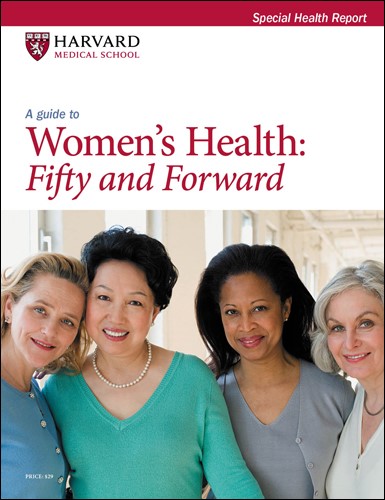After the baby grows up, how will your heart fare?
Certain pregnancy complications can heighten a mother's cardiovascular dangers decades later. Find out who's at risk and why.
- Reviewed by Toni Golen, MD, Editor in Chief, Harvard Women's Health Watch; Editorial Advisory Board Member, Harvard Health Publishing; Contributor

Pregnancy is seldom a walk in the park. But if yours was marked by complications such as high blood pressure or diabetes, you probably hoped those hurdles were behind you after your baby was born.
Hope isn't a strategy, however, when it comes to protecting your health. And it's becoming increasingly evident that certain pregnancy and reproductive factors raise red flags about your cardiovascular health years or decades down the line. The Society for Maternal-Fetal Medicine equates pregnancy to a "cardiovascular stress test," noting that certain complications point toward higher risks for heart attack or stroke later in life.
"We now understand that pregnancy is a window into a woman's future health," says Dr. Brett Young, an OB/GYN and maternal-fetal medicine specialist at Harvard-affiliated Beth Israel Deaconess Medical Center.
For example, women who had high blood pressure or pre-eclampsia (a condition marked by high blood pressure that can impair function of the heart, kidneys, and other organs) while pregnant later develop chronic high blood pressure at least twice as often as women whose blood pressure remained normal in pregnancy. Women who had these blood pressure problems also have 70% higher rates of diabetes and 30% higher rates of elevated cholesterol later in life, according to a Harvard-led 2018 study in the Annals of Internal Medicine.
Diabetes or blood pressure complications, estimated to affect 5% to 10% of pregnancies, are on the rise as obesity rates climb and more women decide to have babies later in life.
"While they often resolve soon after, those conditions can translate into long-lasting increased risks for heart disease for these women," says Dr. Nicolas-Sonny Nguyen, a Boston-area family medicine doctor and clinical instructor at Harvard Medical School. "Once you've finished having children, years or decades may go by where these health issues may not come up."
Common disease features
New research magnifies these revelations. Pregnancy and childbirth complications can pose deadly implications as long as 50 years later, according to a study published online March 8, 2023, by Circulation.
The analysis, which used long-term data from more than 46,000 women who gave birth between 1959 and 1966, tracked participants' deaths from any cause until 2016. Pregnancy-related high blood pressure, gestational diabetes, and preterm delivery were all linked to a greater risk of death in the decades following childbirth.
Meanwhile, problems such as infertility, miscarriage, and stillbirth may be associated with greater stroke risks later in life, according to an analysis published online June 22, 2022, by The BMJ. Researchers reviewed data on nearly 619,000 women ages 32 through 73 from seven countries. Infertility was associated with a 15% higher risk of stroke, while repeated miscarriages were linked to a 37% higher risk. Women who'd had recurrent stillbirths were 44% more likely to die of a hemorrhagic stroke, characterized by uncontrolled bleeding in the brain.
What's the link? Pregnancy and reproductive difficulties can share common features with cardiovascular disease, including blood vessel problems and fat deposits in blood vessel walls, Dr. Young says.
"Pre-eclampsia is a systemwide condition that affects many organs," she says. "We think of it as a disease of the placenta, but the consensus is that it's actually a blood vessel disease that also affects the kidneys, heart, and brain."
Similarly, diabetes during pregnancy may signal simmering problems with a woman's insulin production or how efficiently her cells use energy. "Even if you had gestational diabetes for only a few months of your life in a span of five, six, or more decades, those few months may have made a difference in your risks," Dr. Nguyen says.
The need for check-ups
The mounting research drives home the importance of preventive care and screenings for women who had complicated pregnancies and deliveries — especially at midlife and beyond, when heart disease risks already increase.
"The risks become less silent when women who had these pregnancy conditions reach menopause or beyond," Dr. Nguyen says.
But even younger women — including those whose pregnancies weren't marked by complications — shouldn't skip regular primary care visits. A 2022 study in the journal Hypertension suggests that limited medical follow-up in the year after childbirth may miss high blood pressure in one of 10 new mothers whose blood pressure wasn't elevated during pregnancy.
If you've dealt with pregnancy or reproductive difficulties, tell your primary clinician and your other doctors. Your blood pressure, cholesterol, and blood sugar levels should be monitored regularly, and any irregularities should be "treated aggressively," Dr. Young says.
"Even if a woman had problems during only one of her pregnancies many years ago, that history is very important. It should be part of a conversation for the rest of her life," Dr. Nguyen says.
Also don't ignore even mild symptoms that might be heart disease trouble signs, such as chest pain, unusual fatigue, neck or jaw pain, or shortness of breath.
"Talking about symptoms that pop up is important because early recognition is key," Dr. Nguyen says. "Create a platform to have these conversations with your clinicians instead of waiting years, when coronary artery disease has perhaps been brewing for a while."
High blood pressure during pregnancy also endangers the brainCardiovascular health isn't the only thing that might suffer in the aftermath of pregnancy-related high blood pressure. A new analysis suggests this complication is linked with later cognitive problems as well. The study, published online May 9, 2023, by Neurology, involved more than 2,200 women (average age 73), 83% of whom had at least one pregnancy. Every 15 months over an average of five years, participants took nine tests of memory and thinking that evaluated aspects such as processing speed, executive function, language, and overall cognition. After assessing the women's medical records for pregnancy-related data, researchers found that those who'd had high blood pressure during pregnancy experienced a greater decline in many aspects of thinking skills compared with women who maintained normal blood pressure while pregnant. The effects were even more pronounced among women who'd had pre-eclampsia, a more severe pregnancy-related blood pressure disorder. The findings aren't surprising, given that blood vessel problems that may contribute to pregnancy complications can also affect vessels that carry blood to the brain, says Dr. Brett Young, an OB/GYN and maternal-fetal medicine specialist at Beth Israel Deaconess Medical Center. The results also suggest monitoring and managing blood pressure during and after pregnancy could pay important dividends for brain health later in life. The findings are consistent with the understanding that pregnancy can illuminate a woman's future health risks, including many conditions that affect the blood vessels, Dr. Young says. "The brain," she says, "requires healthy blood vessels just like the placenta does — it's a system based on blood vessels." |
Big-picture risks
Pregnancy complications, of course, are far from the only factor that influences a woman's future pregnancy risk. Also important are family history, race, diet, weight, and physical activity levels.
"It's important to know that heart disease affects one in five women, regardless of age," Dr. Nguyen says. "Some women may think, 'I'm 35 and had my kids, I'm healthy, and there's no way for me to get heart disease.' But that's not true. I emphasize this to encourage women to optimize their lifestyle."
"When you see your health care providers, be honest and thorough about your medical history, especially relating to your pregnancies," says Dr. Nguyen.
Image: © andreswd/Getty Images
About the Author

Maureen Salamon, Executive Editor, Harvard Women's Health Watch
About the Reviewer

Toni Golen, MD, Editor in Chief, Harvard Women's Health Watch; Editorial Advisory Board Member, Harvard Health Publishing; Contributor
Disclaimer:
As a service to our readers, Harvard Health Publishing provides access to our library of archived content. Please note the date of last review or update on all articles.
No content on this site, regardless of date, should ever be used as a substitute for direct medical advice from your doctor or other qualified clinician.
















